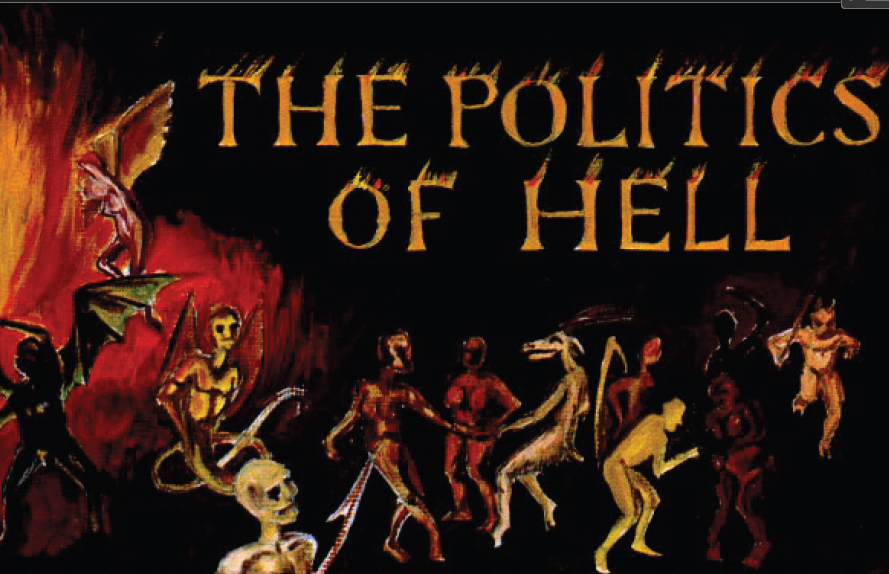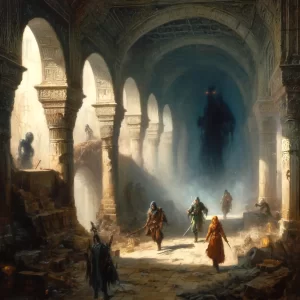
hell
by Alexander von Thorn - Dragon Magazine #28
Author's note: The following article cannot be considered the official doctrine of either Advanced Dungeons and Dragons or the Roman Catholic Church. However, it is compatible with AD&D, and except for the parts about Asmodeus it is not in conflict with works on demonology as generally accepted by Catholic exorcists, thus enjoying tacit approval by the Church. However, this article does not have a nihil obstat; much of it is original, and it approaches the subject from a different angle than a religious tract would and should not be considered as such. The rise of Asmodeus is not documented in any major text on demonology, but very little original work on the subject has been done since the Middle Ages, so it is possible that the situation has changed. Perhaps Mr. Gygax has more accurate sources of information.
Once upon a time, there were no devils. Only God and the angels were in heaven. (The term God is used to refer to the Creator of the Universe. He is called Yahweh by some, Allah by others, and many other names.) The most powerful, most intelligent and most beautiful of all the angels was called Satan. He was given these traits by God in order to carry out the most arduous task among all the angels-that of testing the merit of mortal men. He used temptation and suffering to try to get them to choose evil instead of good. He usually succeeded, because most men had something (or someone) which they held near and dear, over and above considerations of ethics, and so Satan came to hold the majority of mankind in contempt. Satan was not happy in his work, because he had to cause the downfall of many men who otherwise would have led relatively blameless lives. Sometimes he had to cause great suffering for good men, like Job, which he didn't like to do, either. Job had done nothing to deserve the problems that Satan gave him, and Satan came to feel sorry for Job and those like him. Satan felt that God was being unfair. In coming to that conclusion, he set his own judgment above the wisdom of God. He gradually worked around to the idea that there were better ways of organizing the universe than the way God had set up. He came to think that he could do a better job than God. Satan discussed his ideas with other angels, and many agreed that he had some valid points.
Eventually, Satan challenged God, and many angels supported him. But God and his angels were victorious, and Satan and his supporters were sentenced to Hell for all eternity unless they repented their sins. Satan responded, "Better to rule in Hell than to serve in heaven!" With that, he passed to Hell in a brilliant flash, and from that time on his followers, human and supernatural, gave him the name of Lucifer "Prince of Light," and the star of the morning was named for him. The French claim that when Satan passed through the earthly plane en route from Heaven to Hell, he went down through the island of Mont-St.-Michel, off the coast of Brittany. Some scholars theorize that the influence of the devils, who were now actively working against God and good, was the reason that God sent his son to Earth, although that belief is not universal among Christians. However, parts of the Book of Isaiah which refer to a Messiah are thought to have been written during the Babylonian exile of the Jews, which happened shortly after the fall of the devils (at least as far as this writer can figure out). It is also said that God misses Satan, and that He hopes that he will repent and ask God's forgiveness, which of course He will grant to any of the fallen angels (although God may require some service to be performed, in order to test their newfound devotion to the cause of righteousness. It is thought that it is this possibility that holds many of the devils back from repentance. Whatever the reason, none of the devils have repented.)
And so, Satan became the Lord of Hell. All the devils worked for the damnation of men and the promulgation of evil and suffering. Satan found it ridiculously easy to accomplish things using his talents of temptation and suffering. The mere threat of his immense power kept the devils in line. A group of humans who were obsessed by power, or evil, or both, developed a cult around Satan, and they set up a tight hierarchy in order to pursue their goals through evil. Even some of the illiterate peasants occasionally said a prayer to Satan when God didn't seem to answer their prayers. The forces of evil were strong, and flourished in the ignorance of the Dark Ages. Satan schemed and plotted, for he believed that he had simply been outmaneuvered by the forces of good because he had failed to plan his first assault properly, and that if he took the time to develop a strategy, to take advantage of his own strengths and minimize his forces' weaknesses, while capitalizing on the weaknesses of the enemy and neutralizing their strengths, then he had a good shot at winning the final conflict.
But Satan was an arbitrary ruler. He took it for granted that all the fallen angels would follow him without question. But the other devils were also proud, and they did not agree with all the orders that Satan gave, just as they had disagreed with God. Beelzebub in particular, felt that he and the other devils should have more of a free hand in encouraging acts of evil, and more of a say in matters of general policy in Hell. Beelzebub discussed this with the other important devils - Adramelech, Astaroth, Moloch, Nergal, Amaimon, Belphegor, and many others - and most agreed with Beelzebub, after promises of more power and freedom under a new order. The others were noncommittal, for they were afraid of the wrath of Satan, and would not speak against Satan even in private, although they did not reveal Beelzebub's plan to Satan. Those devils who supported Beelzebub would once in a while question a minor order from Satan, or neglect to perform a trivial task. When these were discovered, Satan sent his personal lieutenant Belial to deal with them. So, Belial became hated by the other devils and grew in the esteem of Satan.
Eventually, Beelzebub challenged Satan, and when it was seen that most of the powerful devils supported Beelzebub, the other devils flocked to his cause, leaving only Belial on the side of Satan. So Satan and Belial became exiles from Hell, forced to find other places within the multiverse to hide out and make their abode, while Beelzebub became the new Lord of Hell. With Belial gone, Moloch became the new supreme commander of the armies of Hell, and Asmodeus became the devil in charge of politicians and bureaucrats, while Adramelech became second in the overall hierarchy after Beelzebub, serving as Chancellor of Hell, which was the equivalent of a prime minister of a government of which Beelzebub was president or king. However, the armies of Hell remained loyal to Belial, and they helped him when they had the opportunity to do so without being caught. Also, Belial kept his old contacts, and retained a great deal of his influence with politicians and bureaucrats for some time. Satan, for his part, remained very powerful, because the covens remained faithful to him. In fact, most people including the majority of the clergy, were not aware of the change in the leadership of Hell. To this day, when people think of "The Devil," they think of Satan, and if the name of any devil is mentioned in a Catholic sacramental ritual. it is his (e.g. when the celebrant asks, "Do you reject Satan?," etc.).
Of course, the exorcists and demonologists knew about the change, and after the fall of Satan his name was left out of the hierarchies compiled by them. The time of this event is not certain, but evidence suggests that it probably occurred at about the time of the Renaissance. Indeed, it may have been partially responsible for the Renaissance, because Satan had tried to keep mankind steeped in mystery and ignorance, while Beelzebub thought that new areas of knowledge could lead to new forms of evil. During the Middle Ages, warfare had been a very personal affair. Lords battled over matters of vengeance, or family honor, or simple greed. They were followed by loyal men-atarms owing personal loyalty to their liege, fighting with swords, pole arms and bows, and everyone went home at harvest time. Then came the rise of national empires, and men were drafted into armies in the names of kings they'd never seen, to fight with guns and cannons over matters of politics, or religion, or just strategic objectives. Arbitrary and capricious monarchs gave way to systematic dictatorships of terror. Ignorance and superstition were replaced by science and technology totally devoid of morality. Of course, things were not so bad everywhere, but Beelzebub does seem to have had a point.
However, Beelzebub had difficulty controlling the devils. He could not order them about the way Satan had, because he had gained power by promising more freedom of action. In fact, some of the more powerful arch-devils told him (in a roundabout way) that his authority would be in jeopardy if he tried to assert himself too much. So, the only means that Beelzebub could use to get things done in Hell were by persuasion or by doing favors for the devils. Needless to say, these were not enough, even if Beelzebub had had the time to talk to all the arch-devils in order to explain why things had to be done, or to do all the errands that he had to do to get things done. The devils ended up aiding humans against each other, with little coordination, so that they fell into disrepute because they could not fulfill their conflicting promises. Beelzebub's attempts to restore order were futile because the more powerful arch-devils would not agree with Beelzebub on how to resolve some of the more important conflicts. In fact, some of them preferred to let the situation deteriorate so that they could increase their personal power. Also, the spirit of anticlericism and atheism that the devils had succeeded in creating worked against them, for people rejected the idea of devils as mere superstition when they rejected the idea of a God. Many of the devils were dissatisfied with the rule of Beelzebub, but there was no apparent successor. Astaroth, the next most powerful devil, was happy in his role as Treasurer of Hell, and he almost always achieved his objectives without needing the mantle of authority that being Lord of Hell gave. Adramelech was not a very personally strong devil, and he was rather ineffectual when things were as disorganized as they were. Dispater and Geryon were strong, but they lacked the necessary talents of leadership. Most of the other arch-devils were satisfied to increase their power at the expense of Beelzebub's, because they thought that the position of Lord of Hell was a thankless job, and that if someone with less sheer power than Beelzebub held the post that Hell would be worse off than it already was.
However, there was one arch-devil who felt differently. Asmodeus was an arch-devil, but he was one of the lesser ones. He was sort of an administrative assistant to Amaimon, who was in command of the largest of the four armies of Hell. Asmodeus took care of non-military matters for Amaimon. Asmodeus was also the devil in charge of politicians and bureaucrats, as noted previously, and with the rise of democracies in the 18th and 19th centuries, his influence also became greater. Asmodeus was a master of deception, and he had great skill in finding things out, especially concealed treasures, which were invaluable traits in dealing with politicians. Asmodeus was therefore well-known in Hell, and he was well-informed on important matters in Hell, but most devils saw him as a minor functionary in the upper echelons of Hell. However, the skills of diplomacy and negotiation which he had developed in order to better help human politicians were very useful in Hell, because of the disorganized situation there. More and more Asmodeus found himself mediating disputes and helping to form consensus among the devils on important policy matters. The devils came to respect his judgment, and set him to organizing some of the more important projects. Asmodeus decided that his administrative skills were just what Hell needed. So, he approached some of the more powerful devils and suggested that he might make a better ruler than Beelzebub. Support for his plan was lukewarm at first, so he sweetened the proposal by doing a number of one-shot favors, or promising to do something that they especially wanted. After a while, many came to agree with him, but there were still a significant number who thought that Beelzebub's power was necessary to maintain any semblance of order in Hell. Asmodeus found a solution: he promised to retain Beelzebub in Hell at the top of the hierarchy, second only to himself. The devils agreed to support him so long as they did not have to resort to violence, although they would if necessary refuse to obey Beelzebub's orders in a show of solidarity. Even Astaroth agreed that Asmodeus would probably be a more capable ruler.
With the support of the devils assured, Asmodeus revealed his plan to Beelzebub. Asmodeus demanded that Beelzebub voluntarily reduce his personal strength in order to prevent any possible future challenges to his authority, and that he change his name from Beelzebub, meaning "Prince of Devils," to Baalzebul, meaning "Lord of the Flies" (i.e. little devils). The reason for that was so that the old rituals of power invoking the old name would not work. Beelzebub was enraged with that, and almost attacked Asmodeus, until Asmodeus told Beelzebub to see which side the other arch-devils were on, such as Astaroth. Beelzebub hesitated, and then reconsidered his attack. He summoned Astaroth. Upon his arrival, Astaroth greeted them with, "Hello, Baalzebul. Hello, Lord Asmodeus." And with that Beelzebub knew that he had been overthrown.
Thus it was that Asmodeus became Lord of Hell. Shortly thereafter, the "War to End All Wars" was fought, and then came Mussolini and Hitler, the death camps and purges, the A-bomb and other atrocities in a war that claimed more than 15 million lives in battle and countless other lives. One could say that Asmodeus has had some success. Through his politicking and playing one devil off against another, Asmodeus manages to keep a fairly tight rein on the activities of the devils. Baalzebul still secretly schemes to retake his former position, and there are a few other devils now who think that they could handle the leadership of Hell, but none dare openly oppose the rule of Asmodeus. Asmodeus has reorganized Hell to suit his purposes. Satan had originally divided Hell into nine distinct planes, in order to keep track of which damned soul went where (no pun intended). Asmodeus has dispensed with the old structuring and doled out the planes as sort of fiefdoms under his suzerainty. He kept the ninth plane as his personal demesne and granted the sixth and seventh to Baalzebul, out of respect for his previous service, making him the only devil to rule two entire planes personally. Dispater and Geryon were also granted entire planes because they were the first to support Asmodeus, and they have since been his most loyal followers. The other planes are divided among the other six dozen or so arch-devils. Astaroth was offered a plane, but he declined the responsibility. Asmodeus has used his position to increase his personal strength to the point that he is now the most powerful devil to be found on the nine planes of Hell. This is unheard of, but it was barely permissible by the Laws of the Multiverse because the departure of Satan and Belial from Hell and the reduction in strength that Baalzebu1 took left a slight imbalance in the Multiverse which Asmodeus used to increase his own strength. And so, all the planes of Hell are now securely under the dominion of Asmodeus, Lord Of Hell.
SATAN ("The Prince of Darkness," "The Adversary," Lucifer, "The Prince of Light"): First among devils, Satan is a being feared by all. He can appear in any form he wishes, but the form he prefers is that of a normal man, having features which are most likely to engender trust and respect from the person he is dealing with. In places where he is master (which are rare these days, although becoming more common), he will appear in roughly humanoid form, about 7' tall, with horns, tail and pitchfork and having a deep red skin color, almost maroon, with a majestic countenance. He can move as fast as he wants to, and he can accurately teleport, cross dimensions or even travel through time if need be. In order to strike Satan with a weapon, the attacker would need a +3 weapon to hit him, and he would also have to have a clear conscience and an absolute determination to pursue one's objective, which of course must be of the purest motives. Anyone who dares attack Satan psionically will automatically fall into his control forever (a Wish can recover an individual, but nothing less will do). Of course, Satan cannot be affected by a psionic attack, but he will not use normal psionic attack modes. Satan may use any spell or psionic discipline as often as he likes. He casts spells as if he was a 30th level caster, except for druidic spells, which he casts as a 14th level caster. He uses psionic disciplines as if he had them at the 30th level of mastery with a psionic ability of 500, although he does not actually use any points doing so. Satan also has the ability to alter fate, in order to cause a number of unfortunate events to happen to an individual, such as the death of friends and family and the ruin of business, career, property, social status, reputation and health, to start with. Fortunately, however, for the victim, if he remains resolute in the face of this suffering, the forces of good will eventually relieve his problems in order to maintain the Balance of the Multiverse, although the victim may not receive any compensation for the trouble he has gone through.
Satan's main ability is the power of Temptation. He can grant anyone a wish that will give him anything he desires. All he has to do is sign a little contract, using his own blood in lieu of ink. These wishes are much more powerful than ordinary wishes. Satan can also grant normal wishes without the blood contract, but he rarely does so except to give some kind of assistance to those already doomed, or perhaps as a reward for faithful service. For anything important, he usually insists on a contract. After seven years a person who has sold his soul to Satan for one of these wishes will surrender his soul to the devil (wishes notwithstanding).
If the individual has wished for immortality, then the time of collection is whenever the individual decides that he has had enough of life, and voluntarily goes to Hell (most people do in the end), or else until the person dies by violence (immortality does not protect a person from being killed either by accident or by combat, although Satan will sometimes give a person some protection against this, such as magic armor or a wish or two, or something along those lines, because Satan prefers people to come to hell of their own free will). Most people choose to go to Hell eventually. For those who appear to be able to put up with immortality, Satan has been known to give a few unexpected surprises, which of course is not covered in the contract, in order to make the decision to go to Hell easier by making life a little less pleasant (i.e. intolerable). If a person has not wished for immortality, then he may have more wishes. Each one costs a year of the condemned one's remaining time. It is best to have the contract actually written out, with identical copies for the player character and the DM (which the player should study carefully before signing), because Satan is extremely literal, and he takes sadistic pleasure in twisting the intent of a contract by fulfilling its letter. Normally, a lawyer cannot be consulted on such a contract, and those who will give legal advice on such matters charge an exorbitant fee. The contract will typically be simply worded, stating who gives and gets what (n. b. although the character must sign in blood or the equivalent, the player need not do so; in fact it is recommended that the player not do this because, health considerations aside, it might just turn out to be binding, if the tales are true).
Once an individual accepts a wish from Satan, there is little chance of getting out of the contract, but it is possible. It is impossible to remove the compulsion to surrender one's soul to Satan unless the contract was signed while the individual was not in control of himself, in which case the contract is void and the wish is revoked. Satan will retaliate against, the person responsible for this. However, as long as a person is satisfied with the contract, or at least as long as the person does not want to get out of the contract, there is no power in the universe - not a wish, not even God Himself (well, maybe He can, but He never has) - that can terminate the contract. On the other hand, if the condemned person decides that he wants to get out of the contract, there are steps he can take. He still cannot remove the compulsion to relinquish his soul, but he can enlist the assistance of some ultra-powerful being who will do battle with Satan on his behalf. Unfortunately, once the person decides that he wants to terminate the contract, the time he has remaining in years is reduced to that many hours before Satan comes to collect, so one must act quickly. Also, any other devil will attempt to detain the condemned person, or failing that, to kill him. The devils cooperate with Satan in this one area because the reputation of all devildom is at stake. Naturally, a person cannot take any positive action to get out of a contract without first deciding to do so. Any Jewish, Christian or Muslim cleric of at least Patriarch level (such as a Cardinal, Primate, Metropolitan, Chief Rabbi, Ayatollah, Caliph or equivalent) can invoke the name of the Deity to save the person's soul. However, they usually require some token of one's devotion to the cause of good, such as the performance of some appropriate Quest, as the price of redemption. In any event an Atonement spell must be cast on the person, and a Quest usually is too (hence the requirement of an eighth level cleric). These can be done by God Himself, or any other ultra-powerful being, if He (or he, or she) can be contacted. The normal penalty for failure to complete the Quest is the immediate return of the person's soul to Satan. "Heathen" clerics of eighth level or higher may also call upon their so-called gods to help an individual. However, only those capable of beating Satan would be willing to help, and even then a god might not want to bother unless the god was especially merciful, or the person was particularly worthy of the god's attention. Usually Satan will back down from such a challenge, but if he thinks that he has a good chance of defeating the being then he may make the attempt, If Satan wins, there's probably no second chance.
Satan's allies include those covens of witches who worship him, most others who have sold their souls to him, and Belial. Sometimes Satan will ask one of these humans to perform some task for him. This is entirely voluntary (well, almost: although it's not a good idea to cross Satan), and he will reward the person appropriately upon completion. His enemies include all those devils who acknowledge Asmodeus as Lord of Hell (i.e. all the other devils), all the demons, all the angels, all the gods and other powers of good, chaos, neutrality, or any combination thereof, and all the gods and other powers of lawful evil and neutral lawful or evil who are allied with or support Asmodeus or any other enemy of Satan. (And you thought your character had problems!)
BELIAL (pronounced BEE-lee-ul; the name means "Worthlessness"); At one time, Belial was the devil in charge of politicians, the supreme commander of the armies of Hell and the personal lieutenant of Satan. He now spends most of his time on the run throughout the multiverse. In the Lesser Key of Solomon, a medieval grimoire which lists and describes most of the arch-devils, Belial is described as a beautiful angelic being riding a chariot of fire, and his voice is pleasant to listen to. Belial's Chariot of Fire has three times the hit points and capacity of a Chariot of Sustarre, but otherwise it is equivalent in all respects. If it is destroyed, he can replace it the next day. He has the power of beguiling, with an extra -2 on the defender's saving throw. Those who wish to summon Belial must sacrifice something of great value to the summoner, because he wishes to avoid being summoned by a potential enemy, of whom he has many. Once per turn or melee round, Belial may use any one of the following powers at will: pyrotechnics, produce flame, wall of fire, light, read languages, read magic, detect invisible, locate object, invisibility, beguiling (as noted above), geas, restoration, raise dead fully, (fulfill another's) wish. Once per day he can find a familiar of the summoner's choice automatically, and use a symbol of fear and a symbol of stunning. His skill in dealing with politicians is almost equal to that of Asmodeus, although Asmodeus will attempt to punish anyone that he finds out has been consorting with Belial. As the former commander of the armies of Hell, he still commands great respect from the troops (somewhat like Napoleon). They will not directly act to harm him, and they will give him some assistance if they can do so without being caught by the other arch-devils. In the presence of both Asmodeus and Belial, the armies of Hell will make an attempt to capture Belial, because they do not want the anger of the Lord of Hell upon them. Belial's other allies are Satan and his followers. His enemies are the same as those of Satan, except for the armies of Hell as stated. However, the other devils have more enmity for Belial than for Satan, because Belial did a lot of Satan's dirty work when they were in charge, and Belial seemed to enjoy harassing the devils.
ASTAROTH: This arch-devil is the Treasurer of Hell. He used to be third in the hierarchy behind Beelzebub and Adramelech, but now he acts rather independently of the current regime. Nominally he is still third, behind Asmodeus and Baalzebul, although neither of them would try to pull rank on Astaroth except in a dire emergency. Likewise he never orders other devils around, but sometimes he will exchange favors if he wants something done. He appears as an awesome manlike being who stands 8' in height. He looks somewhat overweight and richly dressed, reeking with filthy lucre. He is also reeking with a burning stench which will cause 1-6 points of fire damage to all creatures within 30', although a ring of fire resistance or its equivalent will protect a being against this. Still, one must make a saving throw versus poison within 10' or lose consciousness from the smell for 2-12 turns unless one can get a Neutralize Poison within one turn. (Losing consciousness in the presence of an arch-devil is not a very bright thing to do, if one can avoid it.) Astaroth usually rides a huge ancient red dragon, and he carries a large pit viper (giant poisonous snake) wrapped around his right arm. He can also strike with his left arm for 1-8 points of damage because, like most devils, he is left-handed.
Astaroth may once per turn or melee round use one of the following powers at will: pyrotechnics, produce flame, wall of fire, ice storm, wall of ice, continual light, read languages, read magic, detect invisible, locate object, invisibility, dispel magic, shape change, beguile, rulership, charm monster, geas, restoration, raise dead fully, (fulfill another's) wish. Once per day he may do each of the following: legend lore, contact lower plane
and precognition (90% accurate). His gaze causes confusion to his enemies (as spell). Astaroth can create treasure, in the form of coins, gems or jewelry, at will. The referee will determine how much he has lying around, and how much can be carried away. He can teach any of the liberal arts very quickly. Astaroth is immune to psionic attack, and he cannot make a psionic attack. He is very inventive in finding out ways to make money.
Astaroth will willingly talk about the fall of the devils, but he does not speak of his own part in that event. In fact, he acts as though he was not subject to the fall, as if he were still working selflessly for the will of God and the good of mankind. Nevertheless, he is a devil of great power, and most devils give him great respect and a wide berth. One must take what he says with a grain of salt. Curiously enough, a number of sources state that Astaroth, in addition to his duties function as the devil responsible for financial matters, is also the devil in charge of supervising the activities of devils in the United Sates. This would seem to indicate that the devils find the United States of great importance and stature, for no other nation has a devil of such rank overseeing it. He may also be partially responsible for all the commercial type that Americans are subject to. Then again, it could just be that mere men create such colossal inanity. No one knows for sure (except maybe God, in which case He will hold those culpable to account for their actions).
N.B. The Lesser Key of Solomon warns that when conjuring Asmodeus, the summoner must not be wearing anything on his head, or else Asmodeus will deceive the summoner. That includes helms and other headgear. Forewarned is forearmed.
Table of stats:
| Attribute | Satan | Belial | Astaroth |
|---|---|---|---|
| FREQUENCY | Very rare | Very rare | Very rare |
| NO. APPEARING | 1 | 1 | 1 |
| ARMOR CLASS | -8 | -4 | -6 |
| MOVE | whatever is necessary | 12" by himself 24"/48" in chariot | 18" by himself 9"/24" on dragon |
| HIT DICE | 333 points | 122 points | 155 points |
| % IN LAIR | 5% | 1% | 5% |
| TREASURE TYPE | H (x2), I (x2), U | U, W | 95% unlimited |
| NO. OF ATTACKS | 1 bite | 1 (plus snake) | 1 (plus snake) |
| DAMAGE/ATTACK | 10-100 | 3-18 + poison | 1-8 (See Monster Manual for snake) |
| SPECIAL ATTACKS | +3 or better weapon and purity of heart required to hit | +2 or better weapon to hit | +3 or better weapon to hit |
| MAGIC RESISTANCE | 95% | 80% | 90% |
| INTELLIGENCE | God-like | Genius | Supra-genius |
| ALIGNMENT | Lawful evil | Lawful evil | Lawful evil |
| SIZE | Variable | L (11') | L (8') |
| PSIONIC ABILITY | Attack/Defense: Special | All | Special |






